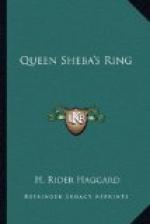Now we were opposite to the valley of Harmac, and saw that the huge sphinx still sat there as it had done for unknown thousands of years. Only its head was gone, for that had “moved to Mur,” and in its neck and shoulders appeared great clefts, caused by the terrific force of the explosion. Moreover, no sound came from the enclosures where the sacred lions used to be. Doubtless every one of them was dead.
“Don’t you think,” suggested Higgs, whose archaeological zeal was rekindling fast, “that we might spare half-an-hour to go up the valley and have a look at Harmac from the outside? Of course, both Roderick and I are thoroughly acquainted with his inside, and the den of lions, and so forth, but I would give a great deal just to study the rest of him and take a few measurements. You know one must camp somewhere, and if we can’t find the camera, at dawn one might make a sketch.”
“Are you mad?” I asked by way of answer, and Higgs collapsed, but to this hour he has never forgiven me.
We looked our last upon Harmac, the god whose glory we had destroyed, and went on swiftly till darkness overtook us almost opposite to that ruined village where Shadrach had tried to poison the hound Pharaoh, which afterwards tore out his throat. Here we unloaded the camels, no light task, and camped, for near this spot there was water and a patch of maize on which the beasts could feed.
Before the light quite faded Roderick rode forward for a little way to reconnoitre, and presently returned announcing shortly that he had seen no one. So we ate of the food with which the Abati had provided us, not without fear lest it should be poisoned, and then held a council of war.
The question was whether we should take the old road toward Egypt, or now that the swamps were dry, strike up northward by the other route of which Shadrach had told us. According to the map this should be shorter, and Higgs advocated it strongly, as I discovered afterwards because he thought there might be more archaeological remains in that direction.
I, on the other hand, was in favour of following the road we knew, which, although long and very wearisome, was comparatively safe, as in that vast desert there were few people to attack us, while Oliver, our captain, listened to all we had to say, and reserved his opinion.
Presently, however, the question was settled for us by Roderick, who remarked that if we travelled to the north we should probably fall in with the Fung. I asked what he meant, and he replied that when he made his reconnaissance an hour or so before, although it was true that he had seen no one, not a thousand yards from where we sat he had come across the track of a great army. This army, from various indications, he felt sure was that of Barung, which had passed there within twelve hours.
“Perhaps my wife with them, so I no want to go that way, father,” he added with sincere simplicity.




